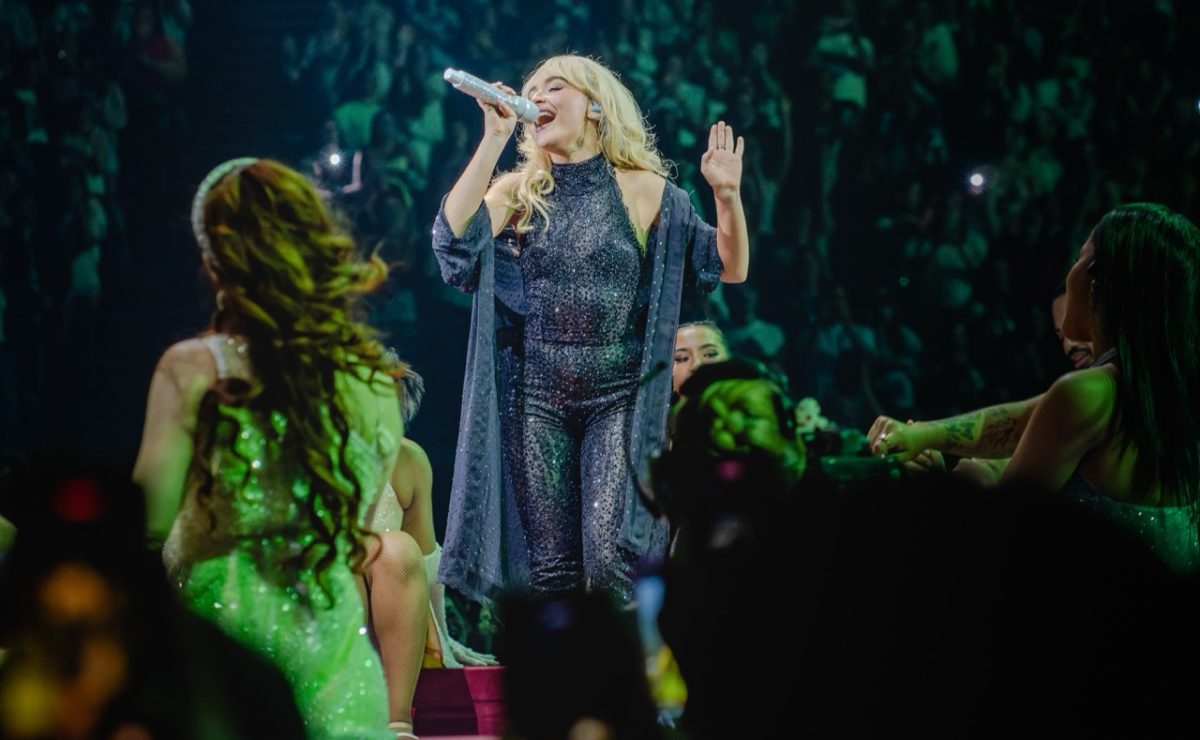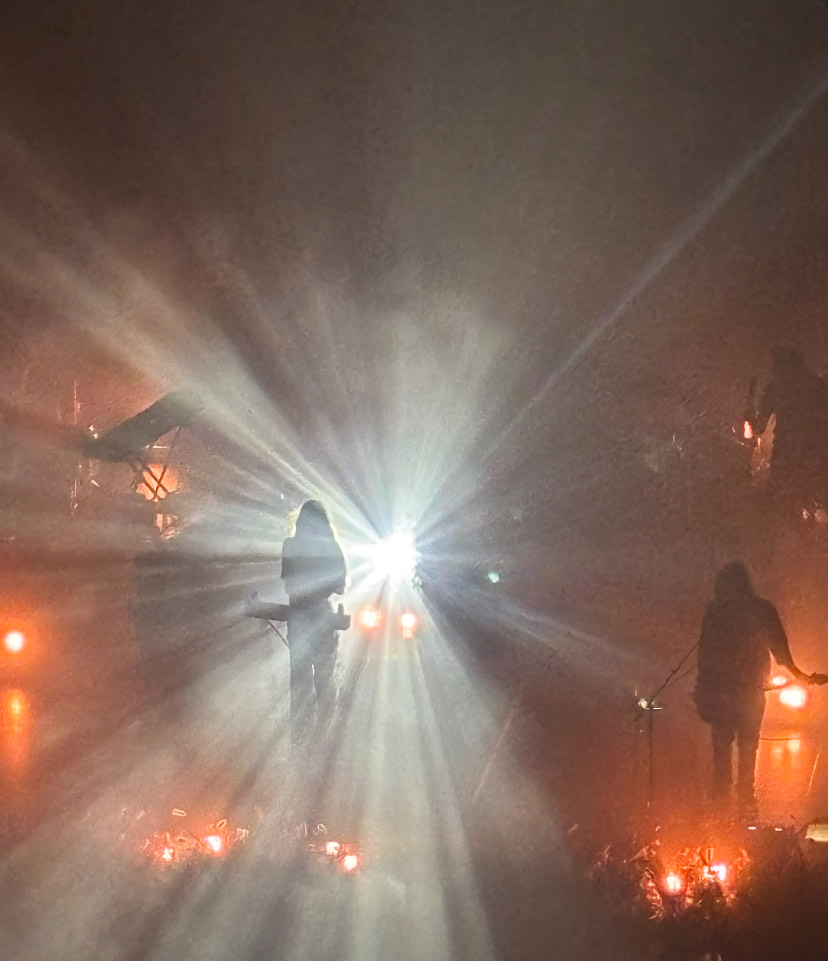
In a phone interview, I discussed with Sprengelmeyer how this record was born, and how it differs from anything she has done before.
TMW: How would you compare this album to your previous one, The Golden Record?
LS: The last record had some ‘up’ songs and more ‘down’ songs, and just took a journey in between different moods. And this one does the same thing, but I wanted to push the ‘up’ part of it… The music I was listening to at the time infused what I ended up working on. And then I pushed the moody, atmospheric stuff even further, and wanted to embrace being able to fully express different emotions and states of being in one record. It’s kind of like the whole lifecycle of a relationship that’s on it, where you get the ups and downs, the ecstasy and the weird things that happen in the aftermath of it: the lost feelings, but also the empathy that arises from that. It just goes to all these moods…rather than conforming to a single place.
Listening to the record, I really got a sense of that lifecycle you were talking about, where you get the ups and downs and everything in between. It seems as if one song flows right into the next. Can you describe how you constructed the album as a whole, and created that path from start to finish?
LS: I started with a lot of the interludes between songs at the same time as I was writing songs, because I specifically wanted to write this album as one, continuous sound-form… It was a way of allowing myself to explore the extremes of sounds in different places, and to make sure that I joined it all together…I was also listening to a lot of DJ mixes, and there was this one by Nicolas Jaar, the BBC Essential Mix, that I was absolutely obsessed with. That mix is incredible, in that he’ll go from a really quiet piano sonata to a rap song. He went all over the place in terms of genre, but he created this environment and this world in which he could place almost anything and have it be coherent, and have it be telling a story. It’s a brilliant piece of music, and I felt like that was the way for me to allow myself to push myself in different areas and tie it all together, by thinking of that Nicolas Jaar piece and by putting that into more of a pop context. That was a big part of my inspiration, so I was conscious very early on that I was working on how to join things together. As soon as I would write a song, I would play it, jam it out with musicians and see where we could make natural bridges into and out of songs. It was an inherent part of the whole writing and recording process this time around.
Could you talk a bit about your process in writing your music, and how you put all those different elements together? What does the overarching journey look like, from your stroke of inspiration to your final product?
LS: I feel like there are two or three ways that songs will come [to me]…Some [songs] start more with words and some start more with music. The rare ones, the ones that I generally like the best, are the ones where everything comes together simultaneously, where you have the words and the music and they’re all pretty linked. Then it’s just a matter of filling in the gaps to make it a coherent song. So I always start with sketches of things… little musical tidbits of words and song together, and then I just work with it. Some songs on this album I rewrote and rewrote, and then I ended up coming back to the original thing I had written even though it had felt sophomoric or too teenaged. But sometimes you just have to push yourself through a process and let yourself arrive at the honesty that you started something out with. And then, like I was saying, I wanted to explore some of the more ‘up’ feelings on this record. When I write on my own, that stuff really easily gets darker and more quiet. I wrote with a couple people who tend to make me happier…I worked with Richard Perry and my sister, my two main writing collaborators, as well as Marcus Paquin, who remixes records and was also involved when I made it into a group process. So it was a pretty good mixture of that: coming up with stuff on my own, and then involving other people to help bring out the brighter, musical side that I wanted to explore.
Could you elaborate on how you collaborated with Richard Perry and others like Mary Margaret O’Hara and Sufjan Stevens?
LS: With Richard Perry, it was more of a fundamental collaboration, because I would bounce ideas off of him. While playing music with him, sometimes we’d arrive at a gem… He had more of a fundamental role in shaping the sound of things. As for all of the other collaborators, it was quite organic. I was working on this record for a period of two-and-a-half years and, in the course of that time, we were hanging out with different musicians. For example, when I was in New York really early on with some of the tracks, I went to Aaron Dessner’s (The National’s) studio, and then was hanging out with Kyp Malone and Sharon Bennett, and I had my own recording gear with me all the time at that point because I was working on the record pretty much nonstop. And so I just had them put vocal on, and I did a thing with Sufjan—I had reached out to him early on. I was talking about joining all the bits of the record together, and he sent me a whole file folder full of stuff he had made, weird atmospheric stuff, which was really generous and awesome. When I reached out to Mary Margaret…collaborating with her was high up there…in terms of life accomplishments.
I’d say that these collaborations would be great life accomplishments for most anybody, and each guest artist on the album adds a new layer of depth. However, don’t be fooled into thinking that Sprengelmeyer sat back for this record while others took the stage. Her unique voice and instrumentation are still what define each and every song she records.
Little Scream performs on Tuesday, October 25th, in Minneapolis’ 7th Street Entry.







Carol Nolan • Sep 10, 2019 at 4:49 pm
It’s really a great and helpful piece of info. I am satisfied that you shared this useful information with us. Please stay us informed like this. Thank you for sharing.
William Paige • Sep 9, 2019 at 6:33 pm
If any one wishes to be a successful blogger, then he/she must study this paragraph, because it carries al techniques related to that.